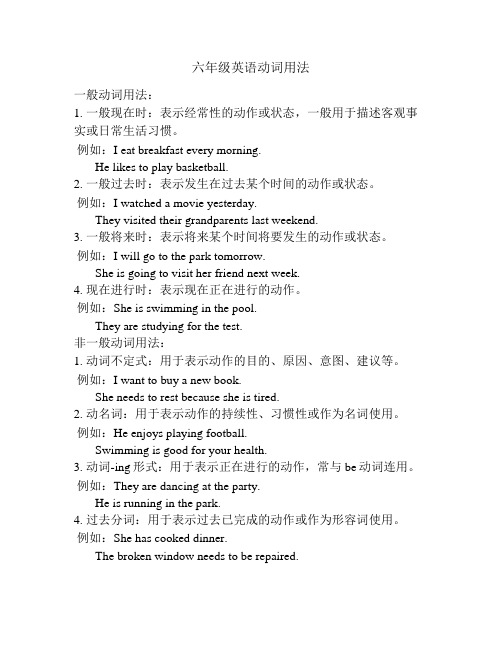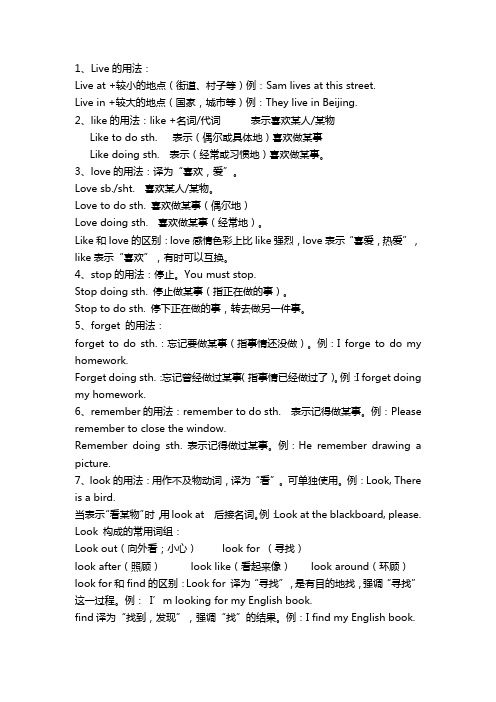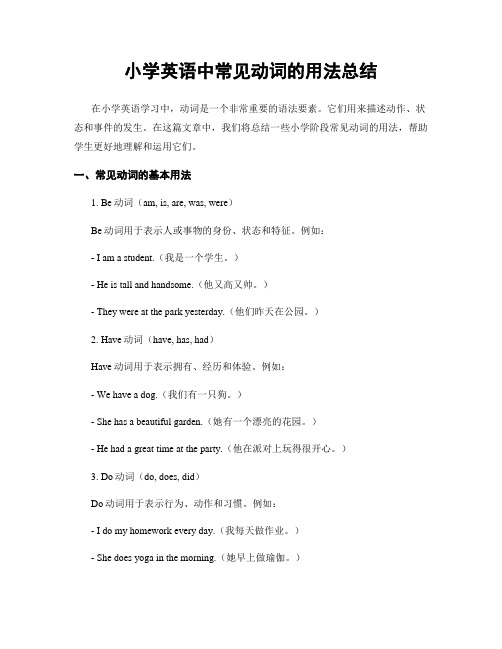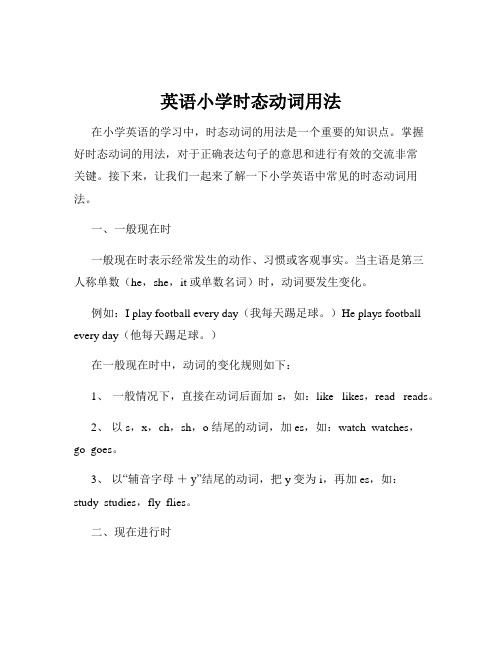小学英语常用动词惯用法
六年级英语动词用法

六年级英语动词用法一般动词用法:1. 一般现在时:表示经常性的动作或状态,一般用于描述客观事实或日常生活习惯。
例如:I eat breakfast every morning.He likes to play basketball.2. 一般过去时:表示发生在过去某个时间的动作或状态。
例如:I watched a movie yesterday.They visited their grandparents last weekend.3. 一般将来时:表示将来某个时间将要发生的动作或状态。
例如:I will go to the park tomorrow.She is going to visit her friend next week.4. 现在进行时:表示现在正在进行的动作。
例如:She is swimming in the pool.They are studying for the test.非一般动词用法:1. 动词不定式:用于表示动作的目的、原因、意图、建议等。
例如:I want to buy a new book.She needs to rest because she is tired.2. 动名词:用于表示动作的持续性、习惯性或作为名词使用。
例如:He enjoys playing football.Swimming is good for your health.3. 动词-ing形式:用于表示正在进行的动作,常与be动词连用。
例如:They are dancing at the party.He is running in the park.4. 过去分词:用于表示过去已完成的动作或作为形容词使用。
例如:She has cooked dinner.The broken window needs to be repaired.。
冀教版五年级英语常见动词的用法

1、Live的用法:Live at +较小的地点(街道、村子等)例:Sam lives at this street.Live in +较大的地点(国家,城市等)例:They live in Beijing.2、like的用法:like +名词/代词表示喜欢某人/某物Like to do sth. 表示(偶尔或具体地)喜欢做某事Like doing sth. 表示(经常或习惯地)喜欢做某事。
3、love的用法:译为“喜欢,爱”。
Love sb./sht. 喜欢某人/某物。
Love to do sth. 喜欢做某事(偶尔地)Love doing sth. 喜欢做某事(经常地)。
Like和love的区别:love感情色彩上比like强烈,love表示“喜爱,热爱”,like表示“喜欢”,有时可以互换。
4、stop的用法:停止。
You must stop.Stop doing sth. 停止做某事(指正在做的事)。
Stop to do sth. 停下正在做的事,转去做另一件事。
5、forget 的用法:forget to do sth.:忘记要做某事(指事情还没做)。
例:I forge to do my homework.Forget doing sth.:忘记曾经做过某事(指事情已经做过了)。
例:I forget doing my homework.6、remember的用法:remember to do sth. 表示记得做某事。
例:Please remember to close the window.Remember doing sth. 表示记得做过某事。
例:He remember drawing a picture.7、look的用法:用作不及物动词,译为“看”。
可单独使用。
例:Look, There is a bird.当表示“看某物”时,用look at 后接名词。
例:Look at the blackboard, please. Look 构成的常用词组:Look out(向外看;小心)look for (寻找)look after(照顾)look like(看起来像)look around(环顾)look for和find的区别:Look for 译为“寻找”,是有目的地找,强调“寻找”这一过程。
小升初重点知识梳理常用动词的用法总结

小升初重点知识梳理常用动词的用法总结常用动词在英语学习中起着非常重要的作用,掌握好它们的用法是提高语言表达能力的关键。
下面是一些常见的动词用法总结,供小升初学生参考。
1. 常用动词的基本用法常用的动词有be, have, do, go, eat, drink等。
它们的基本用法如下:- be:表示存在、状态或描述。
例如:She is a teacher.(她是一名老师。
)- have:表示拥有或经历。
例如:I have a pet dog.(我有一只宠物狗。
)- do:表示行为或动作。
例如:He does his homework every day.(他每天做作业。
)- go:表示移动或前往。
例如:They go to school by bus.(他们坐公交车去学校。
)- eat:表示进食。
例如:We eat breakfast at 7 o'clock.(我们七点吃早餐。
)- drink:表示喝。
例如:She drinks water when she is thirsty.(她口渴的时候喝水。
)2. 常用动词的时态变化动词的时态变化包括一般现在时、一般过去时和一般将来时。
它们的变化规则如下:- 一般现在时:动词原形(或第三人称单数形式,加-s/es)。
例如:He plays football.(他踢足球。
)- 一般过去时:动词过去式。
例如:She danced at the party.(她在派对上跳舞。
)- 一般将来时:will/shall + 动词原形。
例如:We will go campingnext weekend.(我们下周末去野营。
)3. 常用动词的被动语态被动语态指的是动作的承受者位于句子的主语位置,动作的执行者则位于句子的谓语之后。
被动语态的构成如下:- be + 过去分词。
例如:The book is written by Mark Twain.(这本书是马克·吐温写的。
常用动词的习惯用法

常用动词的习惯用法常用动词习惯用法1. allow sb to do sth 允许某人去做某事(后接动词不定式)My father allowed me to go out for a walk after I finished my homework.2. asked sb (not) to do sth 要求某人做某事/要求某人不要做某事My father asked me to study hard.He asked me not to swim alone.be asked to do sth 被要求去做某事/被邀请去做某事I was asked to have dinner with them yesterday.3. be afraid to do sth 害怕做某事She is afraid to ask me questions.4. be afaid of doing sth 害怕做某事I am afraid of going out at night.5. be afaid of sth 害怕某物He is afraid of snakes.6. be frightened to do sth 害怕做某事Sam is frightened to ride a horse.7. be angry with sb 对某人生气be angry at sth 对某事生气8. be amazed to do sth 对做某事感到惊讶He was amazed to meet the girl there.be amazed at sth 对某事感到惊讶They were amazed at the news.9. be busy doing sth 忙于做某事be busy with sth 忙于某事e.g: I was busy washing my car at that time. 那时候我正忙于清洗我的车子。
小学英语中常见动词的用法总结

小学英语中常见动词的用法总结在小学英语学习中,动词是一个非常重要的语法要素。
它们用来描述动作、状态和事件的发生。
在这篇文章中,我们将总结一些小学阶段常见动词的用法,帮助学生更好地理解和运用它们。
一、常见动词的基本用法1. Be动词(am, is, are, was, were)Be动词用于表示人或事物的身份、状态和特征。
例如:- I am a student.(我是一个学生。
)- He is tall and handsome.(他又高又帅。
)- They were at the park yesterday.(他们昨天在公园。
)2. Have动词(have, has, had)Have动词用于表示拥有、经历和体验。
例如:- We have a dog.(我们有一只狗。
)- She has a beautiful garden.(她有一个漂亮的花园。
)- He had a great time at the party.(他在派对上玩得很开心。
)3. Do动词(do, does, did)Do动词用于表示行为、动作和习惯。
例如:- I do my homework every day.(我每天做作业。
)- She does yoga in the morning.(她早上做瑜伽。
)- They did their best in the competition.(他们在比赛中尽力了。
)4. Go动词(go, goes, went)Go动词用于表示移动和前往某个地方。
例如:- We go to school by bus.(我们坐公交车去学校。
)- He goes to the library every Saturday.(他每个星期六去图书馆。
)- They went to the beach last summer.(他们去年夏天去海滩。
)二、常见动词的时态和语态用法1. 一般现在时一般现在时表示经常性或习惯性的动作。
英语中常用动词用法归纳

I.DO1.与表示动作对象的名词连用: 1) we did two concerts last week.2)Go and do your hair.2."行","奏效" 1) No,that won't do,It's too dirty.2) The little bed won't do for him.3.代替上文动词,以避免重复.1)The newspaper here have more pages than they do back home.4.用于强调动词,多用于否定句、疑问、倒装句中。
Often does he read in the morning.5.惯用词组:do everything/all/what sb.can(do)to...do out have sth. to do withdo away with do withdo a good deed do sb. a favordo one's best do sb. an honor of do sthdo sth. about sth. do withoutdo harm/good/wrong to sb. do upII Have1拥有Have you got a dictionary?2.吃,喝what did you havr for breakfast?3.让,使who did the teacher have write the wall-newspaper?4have sth done主要有两种用法和意义:1. “ have + sth (宾语)+ 过去分词(宾语补足语)”意为“让/ 叫/ 使/ 请别人做某事”。
宾语sth 后面用过去分词作宾语补足语,说明sth 与过去分词表示的动作之间是被动关系。
We had the machine mended just now.He has had his hair cut.5.以主要为重,意味着对主语不利的事,有“遭受.忍受”含义。
英语小学时态动词用法

英语小学时态动词用法在小学英语的学习中,时态动词的用法是一个重要的知识点。
掌握好时态动词的用法,对于正确表达句子的意思和进行有效的交流非常关键。
接下来,让我们一起来了解一下小学英语中常见的时态动词用法。
一、一般现在时一般现在时表示经常发生的动作、习惯或客观事实。
当主语是第三人称单数(he,she,it 或单数名词)时,动词要发生变化。
例如:I play football every day(我每天踢足球。
)He plays football every day(他每天踢足球。
)在一般现在时中,动词的变化规则如下:1、一般情况下,直接在动词后面加 s,如:like likes,read reads。
2、以 s,x,ch,sh,o 结尾的动词,加 es,如:watch watches,go goes。
3、以“辅音字母+y”结尾的动词,把 y 变为 i,再加 es,如:study studies,fly flies。
二、现在进行时现在进行时表示正在进行的动作,其构成是“be 动词+动词的现在分词”。
例如:I am reading a book(我正在读一本书。
)They are playing basketball(他们正在打篮球。
)现在分词的构成规则如下:1、一般情况下,直接在动词后面加 ing,如:read reading,play playing。
2、以不发音的 e 结尾的动词,去掉 e 再加 ing,如:write writing,make making。
3、重读闭音节(即:辅音+元音+辅音)的动词,要双写最后一个辅音字母,再加 ing,如:run running,swim swimming。
三、一般过去时一般过去时表示过去发生的动作或存在的状态。
例如:I went to Beijing last year(我去年去了北京。
)She washappy yesterday(她昨天很开心。
)动词的过去式变化规则有很多,常见的有以下几种:1、一般情况下,直接在动词后面加 ed,如:work worked,visit visited。
小学六年级重要知识总结常用动词短语的用法辨析

小学六年级重要知识总结常用动词短语的用法辨析动词是语言中最基本的词类之一,它能够表示人或物的动作、行为、状态、变化等。
在学习英语的过程中,熟练掌握常用动词短语的用法辨析对于提高语言表达能力非常重要。
本文将针对小学六年级学生常用动词短语的用法进行总结和辨析。
1. take off vs. put on这两个动词短语都与穿衣服有关,但用法不同。
take off表示脱衣服,而put on表示穿衣服。
例如:- He took off his coat and hung it on the hook.(他脱下他的外套并挂在衣钩上。
)- I put on my new dress for the party.(我穿上了我新买的洋装去参加聚会。
)2. clean up vs. mess upclean up表示清洁干净,而mess up则表示弄得凌乱。
例如:- Please clean up your room before guests arrive.(请在客人到来之前整理你的房间。
)- The children messed up the living room while playing.(孩子们在玩耍时把客厅弄得一团糟。
)3. turn on vs. turn off这两个短语都与开关、电器有关,但含义相反。
turn on表示打开或开启,而turn off表示关闭或关闭。
例如:- Please turn on the lights in the classroom.(请打开教室的灯。
)- Don't forget to turn off the television before you go to bed.(睡觉前不要忘记关掉电视。
)4. get up vs. go to bedget up表示起床,而go to bed表示上床睡觉。
例如:- My alarm clock rang, and I got up immediately.(闹钟响了,我立刻起床了。
- 1、下载文档前请自行甄别文档内容的完整性,平台不提供额外的编辑、内容补充、找答案等附加服务。
- 2、"仅部分预览"的文档,不可在线预览部分如存在完整性等问题,可反馈申请退款(可完整预览的文档不适用该条件!)。
- 3、如文档侵犯您的权益,请联系客服反馈,我们会尽快为您处理(人工客服工作时间:9:00-18:30)。
小学英语常用动词惯用法动词原形:1 情态动词后用动词原形2 Do does did 后用动词原形3 let sb do sth 让某人做某事4 why not do sth = why don’t you do sth? 为什么不做某事呢?5 had better do sth 最好做某事否定形式had better not do sth 最好不要做某事6 make sb do sth 使得某人做某事动词to do 形式:want to do sth 要做某事Would like to do sth 想要做某事Tell sb to do sth 告诉某人要做某事(否定形式)Tell sb not to do sth 告诉某人不要做某事Ask sb to do sth 要求某人做某事Ask ab not to do sth 要求某人不做某事(否定形式)Plan to do sth 计划做某事Decide to do sth 决定做某事It’s time to do sth 做某事的时间到了动词ing 形式1 介词后面用ing形式Enjoy doing sth 喜欢做某事Like doing sth 喜欢做某事Feel like doing sth 想要做某事Be busy doing sth 忙于做某事Be good at doing sth 擅长做某事How about doing sth = what about doing sth ?做....怎么样?Be interested in doing sth 做某事很感兴趣1. allow sb. to do sth. 允许某人去做某事My father allowed me to go out for a walk after finishing my homework. 2. asked sb. (not) to do sth. 叫某人做事某事(叫某人不要去做某事)My father asked me to study hard. He asked me not to swim alone.be asked to do sth. 被叫去做某事/被邀请去做某事I was asked to have a dinner with them yesterday.3. be afraid to do sth. 害怕做某事She is afraid to ask me questions.4. be afraid of doing sth. 害怕做某事I am afraid of going out at night.5. be afraid of sth. 害怕某物He is afraid of snakes.6. be amazed to do sth. 对做某事感到惊讶He was amazed to meet the girl there.be amazed at sth. 对某事感到惊讶they were amazed at the news7. be busy doing/with sth. 忙于做某事(常考) e.g: I was busy washing my car at that time. 那时候我正忙于清洗我的车子。
I am busy with my work.8. be coming/going/leaving/fiying/moving/dying(某些位移动词用进行时态时表将来) the bus is coming/the dog is dying.9. be excited to do sth. 对做……感到兴奋Jacky was excited to travel there by plane.be excited at sth. Lily was excited at his words. be excited about doing sth. he was excited about passing the exam without going overing books.10. be frightened to do sth. 害怕去做某事Sam is frightened to ride a horse.11. be glad/happy to do sth. 高兴去做某事she is happy to clean the blackboard with me.be pleased to do sth. 高兴做某事she was pleased to help the old man yesterday be pleased with sth. 对某事感到高兴/满意the teacher was pleased with my answer.12. be interested in sth./doing sth. 对某事感兴趣/对做某事感兴趣she is interested in swimming in the river. My brother is interested in Chinese.13. be/get ready for/to do sth. Be ready for sth. 为某事做好了准备We are ready for the exam. Be ready to do sth. 为做某事做好了准备We are ready to have a birthday party for her. get ready for sth.为某事在做准备We are getting ready for the exam.get ready for sth. 为做某事而做准备13. be sorry to do sth. 对做某事感到抱歉14. be surprised to do sth. 对做某事感到惊奇be surprised at sth. 对某事感到惊奇15. be worth doing sth. 值得做某事(worth 后接动词-ing形式,常考)16. begin to do sth. begin/start to do/doing sth.17. can/be able to afford (to buy) sth. 有能力购买(供)……18. can/may/must do sth. could/would/should/might do sth.19. can’t wait to do sth. 迫不急待地去做某事20. decide to do sth. 决定去做某事make up one’s mind to do sth. 下决心去做某事(常考) make a decision to do sth. 对做某事作出决定21. deserve to do sth. 值得/应该做……22. encourage sb. to do sth. 鼓励某人去做某事23. enjoy doing sth. 乐意去做某事24. expect (sb.) to do sth. 期望去做某事25. fail to do sth. 做某事失败succeed doing sth. 成功做了某事26. finish doing sth. 做完某事(后接动词-ing形式) (常考)27. follow sb to do sth. 跟随某人去做某事28. get sb. to do sth. make sb. do sth. let sb. do sth.29. get/have a chance to do sth. 得到一个做某事的机会30. give/pass/show/lend/sell sb. sth./ sth. to sb. buy/get/bring sb. sth. / sth. for sb.31. go on to do sth. 继续做事(常考) go on doing sth. 继续做事(常考)32. hate to do/doing sth. 讨厌/不喜欢做某事33. have fun doing sth.34. have problems doing sth. 做某事遇到困难35. have sb. do sth. have sth. done have sth. to do 有事要做36. hear sb. do sth. 听到某人做某事(后接动词原形,常考) hear sb. doing sth. 听到某人正在做某事(常见)37. help to do sth. 帮忙做某事help sb. (to) do sth. 帮助某人做某事38. hope/wish to do sth. 希望做某事wish sb. to do sth. 希望某人做某事39. I t seems that 这像是……(后接从句)seem to do sth. seem +adj.40. It’s + adj.+(for sb.) to do sth.It’s + adj. +(of sb.) to do sth e.g: It’s glad for him to hear the news.41. It takes sb. some time/money to do sth. 花费某人多长时间做某事(常考)42. pay …for…cost spend…on….. it take …to do sth.43. It’s best for sb to do sth.. 对某人来说做某事是最好的had better do sth. 最好做某事(注意had没有时态和人称的变化,better后接动词原形)44. It’s time for sb. to do sth. 是某人做某事的时候了45. keep (on)doing sth. 坚持做某事(常考) keep sb. doing sth. 让某人做某事(常考)keep sb. from doing sth. 阻止某人做某事(常考) keep sb./ sth. +adj.keep the book for 2 days 借这本书两天(不要用borrow或lend)46. learn to do sth. 学做某事learn sth. from sb. 向某人学习47. like to do/doing sth. 喜欢做某事like sb. to do sth. 喜欢某人做某事48. need to do sth. need doing sth./to be done need sth . needn’t do sth.49. prefer to do sth. rather than do sth. 宁愿……而不愿……(常考)prefer doing sth. to doing sth. 喜欢做……胜过做……e.g: I prefer reading books to going shopping. 比起购物来,我更爱读书。
